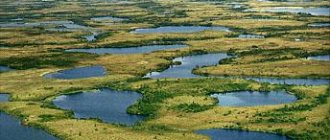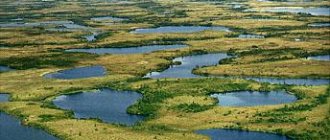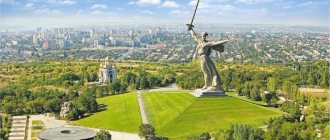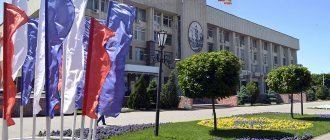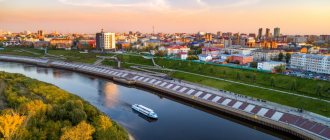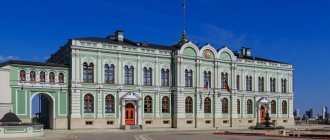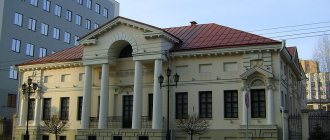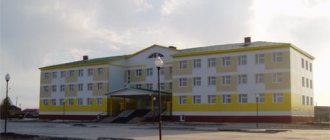Labytnangi is a city located in the lower reaches of the Ob River on the territory of the Yamalo-Nenets Autonomous Okrug. The city is located on the eastern slope of the Ural Mountains, on the other bank of the Ob from it is the capital of the district, Salekhard. Labytnangi lies on the 66th parallel, that is, located just north of the Arctic Circle.
The significance of the city of Labytnangi in the modern world
20 km from Salekhard, the regional center of the Yamalo-Nenets Okrug, on the other bank of the Ob River there is a city with a population of 27 thousand. This is Labytnangi, which is translated from the language of the local people as “seven larches”. This name was given to their camp in the century before last by the Khanty who came here, who still believe in the sacred power of the number “7” and the special properties of a beautiful coniferous tree.
It is not surprising that a huge number of slender larches grow both in the city and on its outskirts. They are on the coat of arms of Labytnangi. The “settlement along the Vyl-Posl channel” in the lower reaches of the Ob River was first mentioned in documents in 1868. At that time, 20 men and 18 women lived here. People were engaged in reindeer herding and fishing. Later, the camp grew into a village, and even later it became a city with an area of 22 thousand km2. Its coordinates: 66°39′29″ N. w. 66°23′02″ E. d.
A new life began after the construction of railway tracks, which were built by Gulag prisoners in Stalin's times. “The 501st construction site” is how the “piece of iron” is sometimes called to this day. Thanks to her, large gas fields in the North, known throughout the country, began to actively develop. The project to extend the railway to the Bovanenkovskoye field was not completed.
Today Labytnangi is the final station on the northernmost railway in the world, which is called the “Gateway of the Arctic”. Labytnangi is a city located on the map of the Ural Mountains on the 66th parallel, that is, the slopes of the Polar Urals. This explains the hilly terrain. Modern Labytnangi is the center of Yamal geological exploration and seismic exploration.
The central base of the large enterprise Yamalgeofizika, which is involved in the discovery of almost all oil and gas fields in the region, is located here. The city is a stronghold of the construction industry, which made it possible to build mining enterprises in Yamal.
The national, state project “Ural Industrial - Ural Polar”, which started 10 years ago and is designed for many years, should change a lot in the Russian economy. The Subpolar and Polar Urals, according to experts, are a real storehouse of minerals, the extraction of which in harsh conditions is a necessary matter for the country. Labytnangi became an outpost in the implementation of the project, a base city for the development of deposits in the Polar Urals.
For more than 70 years, a branch station of the Institute of Plant and Animal Ecology of the Ural Branch of the Russian Academy of Sciences has been operating in the city, which today received the official status of an Arctic Research Station. Locals simply call it “Green Hill” after the street on which it is located. The history of the Arctic Branch is associated with the names of many famous scientists. Almost 10 years ago, Labytnangi’s institution was included in the international project “Interact” for Arctic research.
History[ | ]
The first mention of the Labytnangi settlement dates back to 1868.[8] At the beginning of the 19th century, a Khanty camp called Labytnangi appeared on the banks of the Vyl-Posl River. In 1920, the Labytnangsky village council was formed in the Obdorsk volost of the Berezovsky district of the Tyumen province.[8] At the end of the 1920s, a production partnership was created here, and in 1932 a collective farm appeared. The main occupations of collective farmers were fishing, hunting and reindeer herding. In 1948, Labytnangi became a railway station, and on December 15, 1952 it received the status of a working village as part of the Priuralsky district. On September 28, 1956, it was transferred to administrative subordination to the Salekhard City Council. In the early 1960s, the village became a transshipment base for the development of gas condensate fields. On August 5, 1975, the village was transformed into a city of district significance[8]. On April 9, 1981, the settlement was transferred to the administrative subordination of the City Council. Kharp (since 2004, the village of Kharp has been part of the territory of the municipal formation of the Priuralsky district). The city of Labytnangi is the administrative center of the municipality of the city of Labytnangi, which was established on November 26, 1996.[8]
The city has: Yubileiny Park, Student Square, Molodezhny Square, Avangard Ice Complex, Youth Center.
Climate
Labytnangi is a city on the map in the subarctic climate zone; it constantly experiences the harsh influence of the Arctic Ocean:
- excess humidity;
- cold winters with frequent snowstorms;
- presence of permafrost up to 2 m;
- invasion of cold air waves at any time of the year.
Snow cover 75-90 cm high lies on the ground for more than 200 days a year, and frosts often reach 50 degrees. The snow begins to melt only at the end of April. Summer, by the standards of residents of the central regions of Russia, is cool. The average air temperature is +150C. The transition through the zero mark of the thermometer occurs approximately on May 21 and October 5. Precipitation in the city is 450-500 mm per year. Most of them occur in July and August.
The warm season is accompanied by an abundance of mosquitoes and midges. There are fewer of them within the city limits than outside it, but the midge disappears for a while only in windy weather, and its number declines only with the first frost. In Labytnangi, the Polar Day lasts from June 7 to July 7; there is no Polar Night.
Daytime air temperature (0C), precipitation (mm), number of sunny days:
| Jan. | Feb. | March | Apr. | May | June | July | Aug. | Sep. | Oct. | Nov. | Dec. |
| -19 | -18 | -10 | -3 | +2 | +15 | +17 | +14 | +9 | -1 | -11 | -16 |
| 8 | 10 | 13 | 21 | 22 | 34 | 17 | 19 | 21 | 27 | 15 | 10 |
| 2 | 1 | 0 | 2 | 8 | 14 | 17 | 14 | 6 | 3 | 2 | 2 |
The comfort rating in the city exceeds 4 points on a 5-point system from May to October. The maximum value (4.8) is reached only in July.
Content
- 1 Etymology
- 2 Geography
- 3 Climate
- 4 Status and local government
- 5 History
- 6 Population
- 7 Education and sports
- 8 Transport 8.1 Rail
- 8.2 Air
- 8.3 Automotive
- 8.4 Water (river)
- 9.1 Enterprises and scientific institutions of Labytnangi
Flora and fauna
In the vicinity of the city there are wooded and flat areas. The forests are represented by conifers and broad-leaved trees; dwarf birches and willow grow along the Ob. The flat areas are covered with low-growing shrubs, alder, mosses and lichens.
The fauna of the city's surroundings is represented by 110 species of birds and 150 species of vertebrates. Among mammals, most are predators, and among birds, passerines.
How to get there
Labytnangi is a city on the map of the Far North, which is an important transport hub of Yamal and the country. You can get here by train and car. The nearest airport is in the regional center of Salekhard, at a distance of 20 kilometers.
By plane
From Selekhard Airport there are flights throughout the region and to Russian cities: Moscow, St. Petersburg, Perm, Samara, Simferopol, Omsk, Ufa. The list of aircraft routes is constantly expanding. From Moscow Domodedovo Airport it operates flights to Salekhard lasting 2 hours 50 minutes. Ticket price – 9800 rubles.
To get to your destination from Salekhard airport, you need to move to the other side of the Ob. Depending on the season, this can be a ferry or an ice road - a “winter road”.
By train
Long-distance trains from Moscow and Vorkuta arrive daily at the Labytnangi railway station, located on Sovetskaya Street, 6. Twice a week, a modern, high-tech “Polar Arrow” train departs from the Yaroslavl station of the capital (Internet compartment, satellite communications, game rooms, showers).
Travel time is almost 45 hours, ticket price is from 6,700 rubles. for early booking. On the remaining five days, the flight is operated by the branded train N210 with fares starting from 4,500 rubles.
By car
Highways pass through Labytnangi, connecting the city with the Kharp district, which recently became part of it, Salekhard, and the villages of Muzhi, Azov, and Tegi. After the ice forms on the Ob, the winter road across the river begins to operate. During the warm season there is a ferry service.
Fans of road trips who prefer to travel around the country independently will have to travel almost 3,000 km from Moscow to their destination. Departure from the city is expected along the Yaroslavskoye Highway, then the road will pass through Kirov, Perm and Yugorsk.
By bus
If the weather conditions are favorable, you can get to Labytnangi by bus from Salekhard. On weekdays the interval between flights is approximately 30 minutes, on weekends – 1 hour. The fare is 120 rubles.
Main attractions in Labytnangi
There are few attractions in Labytnangi, but that is why they are especially appreciated by local residents.
Religious buildings
In 2007, a temple was consecrated in the name of the Great Martyr George the Victorious, which took 9 years to build. Until that day, parishioners attended a temporary church, which bore little resemblance to an Orthodox religious building. Rebuilt from a former logging club, the wooden structure could not accommodate everyone who wanted to attend the service.
The new temple on Komsomolskaya Street, 12 is a stone, five-domed structure with an attached hipped bell tower. Divine services are held regularly: at 6:30 and 16:00.
Museums
There are two museums in the city. The city's local history museum has been open since 1995.
Today the exhibition includes 7.5 thousand items telling about:
- stories of Labytnyanga;
- nature of Yamal;
- city-forming enterprises;
- famous townspeople;
- war years.
There are exhibitions dedicated to the indigenous peoples of the region. The exhibition displays national clothing, household items, hunting items, and tools. Jewelry and outfits embroidered with pieces of fabric, fur, and beads leave a huge impression. In addition to the main exhibition, the building houses exhibitions organized by museum workers. The topics are very varied.
For example:
- The heroic march of Russian troops on March 18, 1809 across the ice of the Gulf of Bothnia during the war with Sweden.
- Creation and development of the Kharbey mine, its activities today.
- The path from the camp of several reindeer herders to the transport and logistics point of Yamal.
- A story about Arctic exploration expeditions.
The museum does a lot of educational work; there are interest clubs here: “Club of Friends”, “Arina Rodionovna”, “Young Geologist”. The institution is located on Pervomaiskaya Street, at house 29. The entrance ticket costs 100 rubles. The core storage facility is the district Geological Museum on Oktyabrskaya Street, 15. Previously, the building stored samples of rocks and minerals brought by geologists and collected on the territory of Yamal.
Today it is the same, but the storage facility has also begun to serve as a museum. In the large and bright hall there is a permanent exhibition telling about the underground riches of the region, about exploration of deposits, about production. The exhibition is constantly being updated due to ongoing exploration work in Yamal.
Some artifacts take visitors back many centuries, into ancient times. Other exhibits can only be highly appreciated by specialists. The museum is of interest to those who want to learn more about the promising direction of development of the peninsula and the city.
Natural attractions
Labytnangi is a city on the map of the Polar Urals, which is located in the zone colored green. This is the Ob River valley with flat vegetation - forests and fields. However, the residents of Labytnangi continue to decorate their city with green plantings, creating parks and public gardens. In 2022, the entire city closely followed the transformation of a section of territory on Pervomaiskaya Street.
The Yubileiny Square was created here: large-scale excavation work was carried out to level the level and transport soil, install drainage, install cables and utility networks. A retaining wall and framed terrace paths lined with paving slabs were installed. Beautiful lanterns began to perform complex illumination of objects. The “wild”, unkempt stream that flowed here was transformed: its bed was cleared, and the banks were decorated with rubble stone.
Openwork bridges were built across streams and shallow ravines. The transformed territory is now decorated with arches, wooden mini-sculptures, benches, a beautiful rotunda, and a fountain. The huge letters spelling out the name of the city reveal this wonderful comfort zone to those entering.
Monuments
Residents of Labytnanga carefully preserve the events and names of people who influenced the historical development of the city. At first, the square in the city center, at the intersection of Gagarin and Pervomaiskaya streets, was simply called Square. In 1985, a monument to the memory of participants in the Patriotic War of the 1940s, the “Monument of Glory,” was erected here. After 20 years, granite boards and steles with the St. George ribbon and an imitation of the eternal flame appeared.
City holidays, demonstrations, and rallies dedicated to great dates began to take place here. In 2010, the City Duma brought up for discussion among residents the issue of naming the square. This did not cause any difficulties for the townspeople, who had long called it Victory Square among themselves. This fact was legalized. In 2015, a capsule with sacred soil, watered with the blood of heroes, was brought from Brest. She was solemnly laid at the base of the memorial.
V.G. Nak is an Honored Builder of Russia, a travel engineer who built many transport, industrial and housing facilities during his working life. But he called his main task the construction of a railway in Yamal (the Obnorskaya-Bovanenkovo section). The road changed the life of not only the builder, but also the entire region and touched every resident. Grateful Yamal residents included Nak in the list of honorary citizens of the Yamalo-Nenets District.
A man of strong character who worked in harsh conditions, he showed humanity and care in leading people. He is often remembered with a kind word on this earth. The monument on Shkolnaya Street consists of a bronze bust of V. G. Nak, installed against the background of a composition symbolizing the railway track with the span of the bridge across the Ob, which, unfortunately, has not yet been built.
At the foot of the composition there is a bronze slab with a map of Yamal and a railway that passed through the region, where the dotted lines show the planned but not built sections.
In the park on Yu.A. Gagarin, next to the building of the Department of Civil Defense and Emergency Situations, in 2022 a Monument to city firefighters who died in the line of duty was opened. The initiative to create the monument came from employees of the local fire department, who over the past 30 years have lost 14 colleagues in the fight against fire.
Notes[ | ]
- ↑ 123
The permanent population of the Russian Federation by municipalities as of January 1, 2022 (Russian). Retrieved April 27, 2022. Archived May 2, 2022. - Pospelov, 2008, p. 267.
- Climate: Labytnangi - Climate graph, Temperature graph, Climate table - ru.Climate-Data.org (undefined)
. ru.climate-data.org. Date accessed: October 3, 2022. - Labytnangi (Russian). wikimapia.org. Date accessed: October 3, 2019.
- Law “On the administrative-territorial structure of the Yamalo-Nenets Autonomous Okrug”
- The names of the municipal entity according to the charter of the city district are: “municipal entity city of Labytnangi” and “city of Labytnangi”
- Current documents / Administration of the city of Labytnangi (unspecified)
. lbt.yanao.ru. Access date: September 26, 2022. - ↑ 12345
Charter of the municipal formation of the city of Labytnangi - Head of Administration
- Administration of the city of Labytnangi (Russian). lbt.yanao.ru. Date accessed: November 5, 2022.
- Zuikov Evgeniy Gennadievich
- All-Union Population Census of 1959. The size of the urban population of the RSFSR, its territorial units, urban settlements and urban areas by gender (Russian). Demoscope Weekly. Access date: September 25, 2013. Archived April 28, 2013.
- All-Union Population Census of 1970 The size of the urban population of the RSFSR, its territorial units, urban settlements and urban areas by gender. (Russian). Demoscope Weekly. Access date: September 25, 2013. Archived April 28, 2013.
- All-Union Population Census of 1979 The size of the urban population of the RSFSR, its territorial units, urban settlements and urban areas by gender. (Russian). Demoscope Weekly. Access date: September 25, 2013. Archived April 28, 2013.
- All-Union population census of 1989. Urban population (undefined)
. Archived from the original on August 22, 2011. - ↑ 12345678
People's encyclopedia "My City". Labytnangi - All-Russian population census 2002. Volume. 1, table 4. Population of Russia, federal districts, constituent entities of the Russian Federation, districts, urban settlements, rural settlements - regional centers and rural settlements with a population of 3 thousand or more (unspecified)
. Archived from the original on February 3, 2012. - The size of the permanent population of the Russian Federation by cities, urban-type settlements and regions as of January 1, 2009 (unspecified)
. Retrieved January 2, 2014. Archived January 2, 2014. - All-Russian population census 2010. Population size and its distribution in the Tyumen region (unspecified)
. Retrieved May 10, 2014. Archived May 10, 2014. - Population estimate at the beginning of 2011 for the municipalities of the Yamalo-Nenets Autonomous Okrug (unspecified)
. Retrieved January 30, 2015. Archived January 30, 2015. - Population of the Russian Federation by municipalities. Table 35. Estimated resident population as of January 1, 2012 (unspecified)
. Retrieved May 31, 2014. Archived May 31, 2014. - Population of the Russian Federation by municipalities as of January 1, 2013. - M.: Federal State Statistics Service Rosstat, 2013. - 528 p. (Table 33. Population of urban districts, municipal districts, urban and rural settlements, urban settlements, rural settlements) (undefined)
. Retrieved November 16, 2013. Archived November 16, 2013. - Table 33. Population of the Russian Federation by municipalities as of January 1, 2014 (unspecified)
. Access date: August 2, 2014. Archived August 2, 2014. - Population of the Russian Federation by municipalities as of January 1, 2015 (unspecified)
. Access date: August 6, 2015. Archived August 6, 2015. - Population of the Russian Federation by municipalities as of January 1, 2016 (Russian) (October 5, 2018). Retrieved May 15, 2022. Archived May 8, 2022.
- Population of the Russian Federation by municipalities as of January 1, 2022 (Russian) (July 31, 2017). Retrieved July 31, 2022. Archived July 31, 2022.
- Population by urban districts and municipal districts of the Yamalo-Nenets Autonomous Okrug at the beginning of 2018 (unspecified)
. - Population of the Russian Federation by municipalities as of January 1, 2022 (Russian). Retrieved July 31, 2019. Archived May 2, 2022.
- Population of the Russian Federation by municipalities as of January 1, 2022 (Russian). Date accessed: October 17, 2022. Archived October 17, 2022.
- taking into account the cities of Crimea
- https://rosstat.gov.ru/storage/mediabank/bul_Chislen_nasel_MO-01-01-2021.rar Population of the Russian Federation by municipalities as of January 1, 2022 (1.85 Mb, 07/30/2021)
- Attractions / Administration of the city of Labytnangi (unspecified)
. lbt.yanao.ru. Access date: September 26, 2022. - Today in Labytnangi the ceremonial commissioning of the ice rink with artificial ice “Avangard” took place / Administration of the city of Labytnangi (unspecified)
. lbt.yanao.ru. Date accessed: October 1, 2022. - Administration of the city of Labytnangi (Russian). lbt.yanao.ru. Date accessed: December 24, 2022.
- Landing sites and airfields (undefined)
. www.favt.ru. Access date: September 25, 2022. - On approval of the list of public roads of regional or intermunicipal importance of the Yamalo-Nenets Autonomous Okrug (as amended on July 3, 2022), Decree of the Government of the Yamalo-Nenets Autonomous Okrug dated March 10, 2011 No. 108-P (unspecified)
. docs.cntd.ru. Date accessed: October 2, 2022. - New status of the Surgut - Salekhard highway (unspecified)
. www.uds.ru. Access date: September 25, 2022. - About the company | Salekhard river port (undefined)
. salport.ru. Date accessed: October 2, 2022. - History of the city (Russian). Labytnangi Museum (February 10, 2016). Date accessed: October 2, 2022.
- About the hotel Seven larches | Labytnangi city (undefined)
.
sevenlbt.ru
. Access date: August 24, 2022. - ↑ 1 2
Honorary citizens / Administration of the city of Labytnangi
(unspecified)
. lbt.yanao.ru. Date accessed: September 4, 2022. - Bulletin of the Arctic (unspecified)
. vzlbt.yanao.ru. Date accessed: September 4, 2022. - Labytnangi-TV - “NEWS” (Russian). Labytnangi-TV. Date accessed: September 4, 2022.
- ““The end is near”: Sentsov’s sister reported the deterioration of the director’s condition”
Leisure
Since 2003, Labytnangi has been a ski resort in Yamal. The Oktyabrsky complex, located 7 km from the city, is open all year round. From November to May, winter sports enthusiasts come here to relax; the rest of the time, it is at the disposal of fishermen, mushroom pickers, and berry pickers. The use of artificial snowmaking on the slope allows you to extend the ski season. The complex has one track 630 m long with a height difference of 110 m.
Its difficulty is indicated in blue, that is, the difficulty of the route is low. It is convenient for families to come here; on the slopes with an average slope of 160 degrees, both experienced and beginner skiers and children feel comfortable. Children are allocated a specific area to master the technique; classes are taught by experienced masters.
“Oktyabrsky” has one drag lift; for children there is a 200 m long baby lift and a tubing descent. Sports equipment can be rented.
The route is prepared by specialists using special equipment:
- snow cannons;
- compacting machine "Ratrak";
- snowmobiles.
There is a hotel, baths, and cafe on the territory of the complex. The cost of one climb to the mountain is 50 rubles, a daily subscription is 500 rubles.
Interesting places to relax with children
Labytnangi is a place where children take care of interesting leisure activities. New children's sports and educational institutions and playgrounds regularly appear on the city map.
Ostrovok Park
In 2022, a multifunctional area with recreation areas for people of all ages was opened. It is located at the intersection of Dzerzhinsky and Avtostradnaya streets.
Play structures with slides, rope parks, obstacle courses, and areas with outdoor exercise equipment are now available to young city residents. They pay special attention to cascades of hills with atraumatic surfaces. For recreation, the park, which is open year-round, has warm benches and heated pavilions.
Multifunctional Children's Play Complex
The complex is open daily, seven days a week, located on the street. Gagarina, 28. Here, under one roof, there is a sports and entertainment center, children's playrooms and playgrounds.
Route for exploring the city on your own in 1 day
All the city's attractions are located in its central part, within walking distance of each other. Therefore, walking along the streets from the Ob or from the modern railway station, which is also a landmark and the pride of local residents, you can explore it in one day.
Scroll:
- a square where a monument to firefighters is erected;
- a small sculptural composition that illustrates the historical activities of the indigenous people “Deer and Fish”;
- Memorial of Glory, which is clearly visible even in the dark, thanks to the solemn and thoughtful lighting;
- the building of the city House of Culture, which is the center of cultural life in Labytnanga; all the main events are held here, various studios, sections and clubs operate here;
- city local history museum;
- monument to V.G. Naku.
Population[ | ]
| Population | |||||||
| 1959[12] | 1970[13] | 1979[14] | 1989[15] | 1996[16] | 1998[16] | 2000[16] | 2001[16] |
| 5220 | ↗9190 | ↗17 667 | ↗31 501 | ↘26 900 | ↗27 400 | ↘26 500 | ↘26 100 |
| 2002[17] | 2005[16] | 2006[16] | 2007[16] | 2008[16] | 2009[18] | 2010[19] | 2011[20] |
| ↗27 304 | ↗27 400 | →27 400 | →27 400 | ↘27 300 | ↘27 153 | ↘26 936 | ↘26 898 |
| 2012[21] | 2013[22] | 2014[23] | 2015[24] | 2016[25] | 2017[26] | 2018[27] | 2019[28] |
| ↘26 572 | ↘26 279 | ↗26 359 | ↗26 549 | ↘26 331 | ↘26 281 | ↘26 122 | ↗26 211 |
| 2020[29] | 2021[1] | ||||||
| ↗26 295 | ↗26 520 | ||||||
As of January 1, 2022, in terms of population, the city was in 545th place out of 1116[30]cities of the Russian Federation[31].
Hotels
There are hotels in the city where you can stay if you come to Labytnangi for a few days.
Hotel complex "Seven Larch"
The three-star hotel is located on Gagarin Street, 34, one and a half kilometers from the railway station, which is the city center. The four-story hotel and restaurant complex has been in operation since 2001. In the adjacent territory there is a park with larch and spruce trees and well-groomed lawns.
The rooms are equipped with everything necessary in accordance with the selected category. Services are provided for food delivery to the room, visiting the sauna, calling a taxi and others. The cost of living in a separate room is from 3800 rubles, beds in a double room are 1900 rubles.
Hotel Priuralye
The hotel is located on Sovetskaya Street, 10, in close proximity to the city station. The rooms are decorated in a classic style, household appliances are connected, and the bathroom is equipped with hygiene products. There are grocery stores nearby. Room price – from 2400 rub.
Transport
Public intracity transport in Labytnangi is represented by buses and minibuses serving several routes: No. 1, No. 1-B, No. 1-D, No. 1-P, No. 2, No. 2-D, No. 4 and No. 5. This number of routes is quite enough for a city that is small in size and population. Most routes start at 06:00 and end at 21:00 – 22:00. The fare is 26 RUR. An alternative to public transport is a taxi; the cost of a taxi ride around the city starts from 100 RUR.
What to bring as a souvenir
Souvenir products are sold in all stores in the city. These can be figurines made of bone and wood, mugs and plates with the symbols of Labytnangi, jewelry made of fur and leather. Guests of the city also take home delicious souvenirs: dried berries and mushrooms, dried fish and venison.
Labytnangi is a city often visited by business travelers. Other guests don’t come here often, because on the map of Russia it is too far from the tourist trails. However, travelers who have been here before claim that much has changed in the city over the past decades. Perhaps the time will come when the Polar Arrow will bring numerous excursion groups to the Labytnangi station.
Urban population
The population of Labytnangi is a little over 26 thousand people and over the past 20 years the number has not changed much. Compared to 1989, the number of city residents fell by 5 thousand people, which is minuscule compared to many polar cities (for example, in Vorkuta the population has more than halved). Most of the city's residents are Russian by nationality; Nenets and Khanty also live here.
